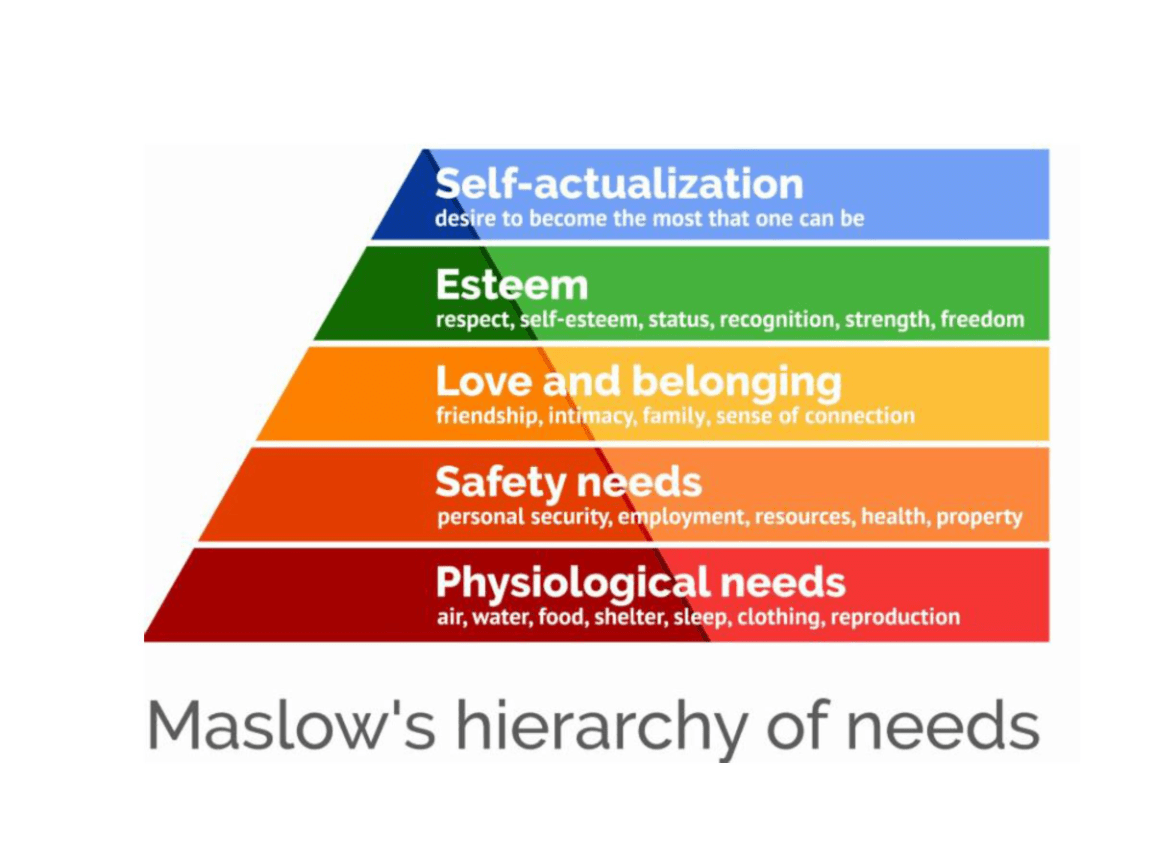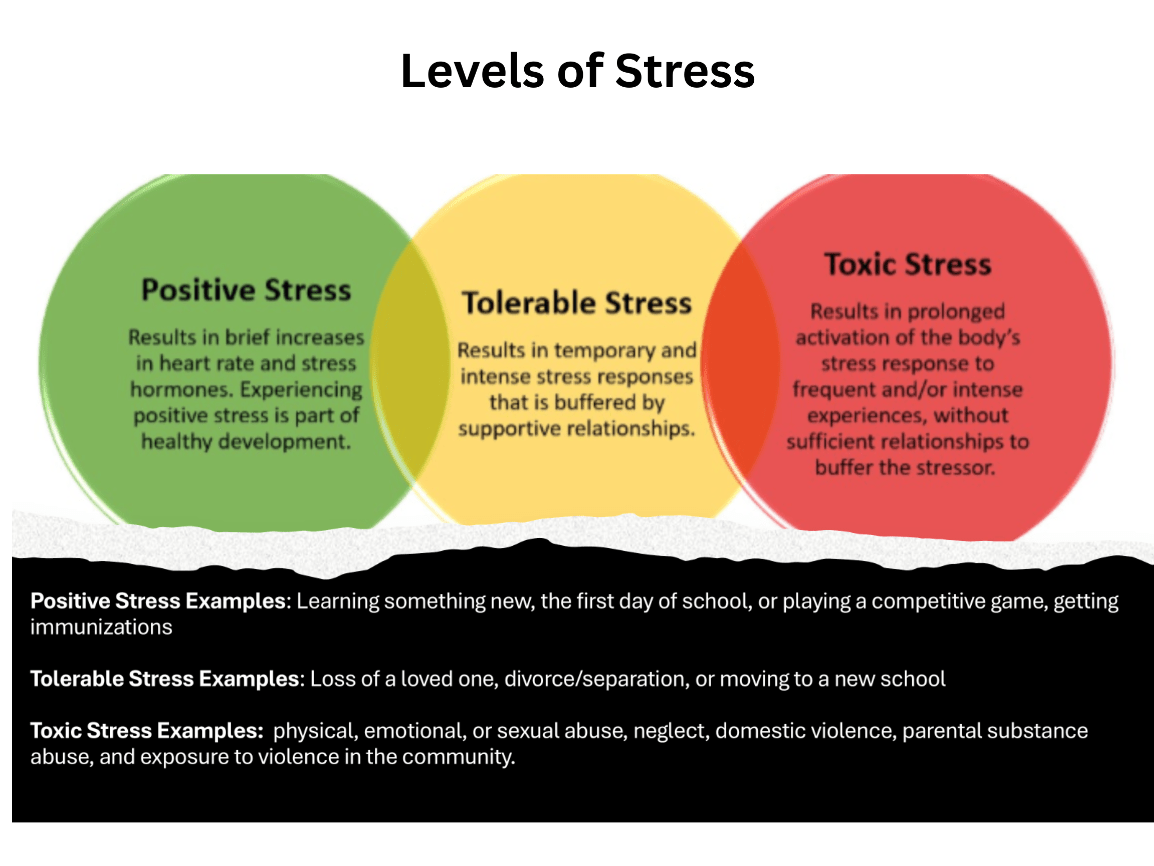What does the acronym ACEs stand for?
Adverse
Childhood
Experiences
A. The Maslow Hierarchy of Needs has ___ levels
Bonus 100
What is the basic level?

Young children naturally reach out for interaction through facial expressions, and gestures, and adults respond with the same kind of interacting. This back-and-forth process is fundamental to the wiring of the brain, especially in the earliest years.
True or false
Answer: True
During the session on intergenerational trauma, we watched a video in which a woman discussed what she does to create a daily routine and structure.
What does she do?
Answer:
She created a nightly routine for her and her daughter to go to bed at 9 pm. After 9 pm, she doesn't accept phone calls, The point is to get enough rest so she's equipped to deal with daily stress
Name the three levels of stress

True o False
Epigenetics is the study of changes in the ways that your genes function.
How behaviors and environment can cause changes that affect the way your genes work.
Answer: True
The study of changes in the ways that your genes function. How behaviors and environment can cause changes that affect the way your genes work.
Epigenetic changes are reversible
Epigenetic changes do not change DNA, however they can change how your body reads DNA
Name 4 Adverse Childhood Experiences (ACEs)
Answer:
Abuse (physical, emotional, verbal, sexual)
Neglect
Household Dysfunction (mental illness, divorce, substance, incarceration)
Community violence
Racism
Witnessing domestic violence
Name three of the levels in the Maslow Hierarchy of Needs
Answer:
Physiological Needs
Safety Needs
Love & Belonging
Esteem
Self Actualization
What structural brain differences or limited abilities can occur in adults who were maltreated as children?
Answer:
Adults who were maltreated as children have reduced learning and memory capabilities
True or False
The consumption of junk foods, has been linked to mental health.
Answer:
True
What are healthy strategies and techniques used to manage stressful or challenging situations. They help individuals regulate their emotions, reduce stress, and maintain their well-being
Answer:
Coping Skills
Define intergenerational trauma?
Answer:
- Intergenerational trauma refers to the transmission of trauma between generations of a family
- People who experience ACEs growing up or who survived historical traumas, may pass the effects of those traumas on to future generations
ACEs can potentially reduce a person's life expectancy by ____________ years.
Answer: 20 years
What level in the Maslow Hierarchy of Needs is described as "the desire to become the most/the best that one can be"
Answer:
Self Actualization
A great deal of brain architecture is shaped during the first ____years after birth, but the window of opportunity for its development does not close at this age
Answer: 3 years old
A great deal of brain architecture is shaped during the first 3 years after birth, but the window of opportunity for its development does not close at this age
Bonus- Double Score
Serotonin is often called the "feel-good" chemical because it helps regulate mood.
Low serotonin levels are linked to mental health conditions like anxiety and depression.Nutrients like vitamin D and omega-3s essential for serotonin production and function.
Name a food source for omega 3's
Answer:
Oily fish like salmon, mackerel, and anchovies
Plant based sources like walnuts, flaxseeds, chia seeds
Developing communication skills
Thinking ahead about consequences before acting
Learning to self advocate
Developing positive relationships
Learning to ask & accept help
Are examples of______________
Answer:
Building Resilience
Name two effects of intergenerational trauma? How are families impacted?
-Increased risk of mental health challenges
- Unhealthy coping skills
- Increased risk of chronic disease
- Diminished attachment skills
- Cycles of poverty & violence
- Impacts communication patterns in families
- Difficulty forming healthy relationships
Experiencing many ACEs without supportive adults can cause___________________
Answer: Toxic Stress
What year was the Maslow Hierarchy of Needs created?
Answer:
1943
Adverse Childhood Experiences (ACEs) can reduce gray matter in the brain's prefrontal cortex and affect
_________________ and self-regulation
Answer:
Decision making
These are the types of personal boundaries, you can set for yourself in relationships---emotional, physical, time, sexual, and __________
Double Score!
Answer:
Intellectual
Self Discipline builds resilience. Please define "self discipline"
Answer:
The ability to control your thoughts, behavior, and emotions when you face challenges, setbacks, and temptation
Helps you stay focused on long term goals
Adult trauma survivors often have difficulty expressing their needs and wants.
The way trauma is communicated or not communicated across generations can either _____ or ______the negative effects of trauma
Answer:
The way trauma is communicated or not communicated across generations can either continue or decrease the negative effects of trauma
Beyond mental health, ACEs may contribute to physiological changes like inflammation that can pave the way for _________ conditions like _________ and
____________
Answer:
Chronic (health) conditions like diabetes, obesity, and cardiovascular disease
What is the Maslow Hierarchy of Needs?
Answer:
The Maslow Hierarchy of Needs is a 5 level pyramid that proposes a hierarchy of human needs from the most basic needs to the highest need of reaching your full potential
What hormone is released during periods of high stress? High levels of this hormone results in chronic stress, making it hard for the brain to grow and learn.
Answer:
Cortisol
True or False
Chronic inflammation can increase the risk of mood disorders like depression and anxiety,
Answer: True
Factors like poor diet, obesity, chronic stress, and even gut microbiome imbalances can trigger inflammation, which then affects the brain and mental state
Name the 3 C's of effective communication
Answer:
Clear
Concise
Consistent
What are two signs that you need to set healthy boundaries?
Answers:
You feel overwhelmed or burned out
You have no time for yourself
You feel resentment towards people who ask for your help
You avoid others who may ask fo help